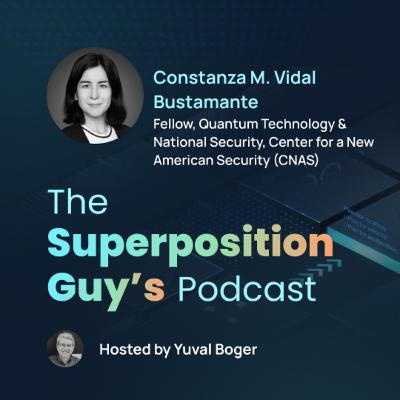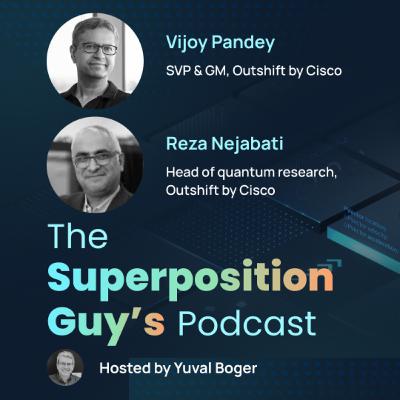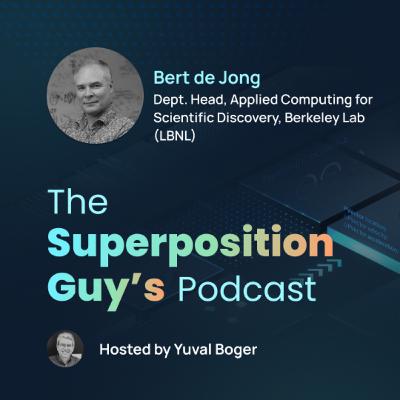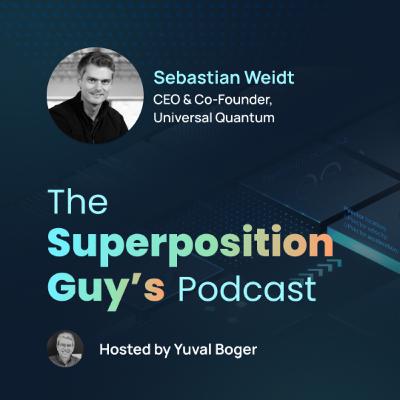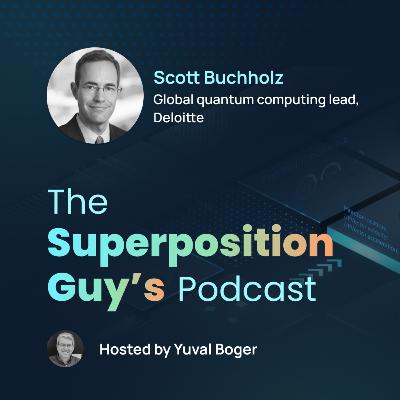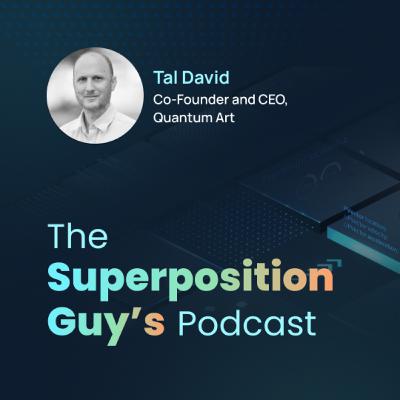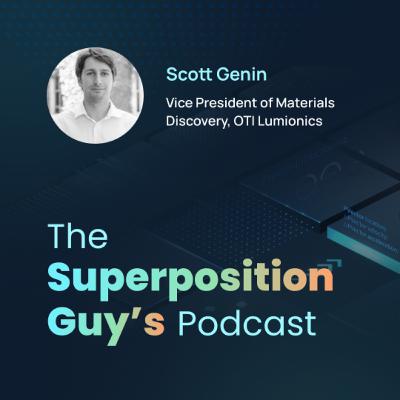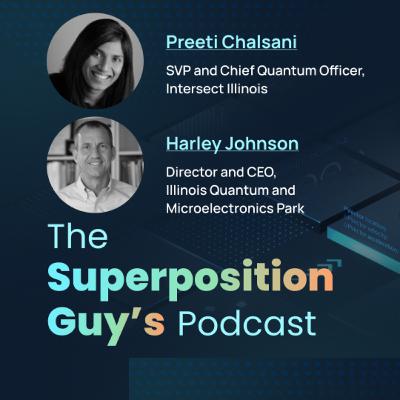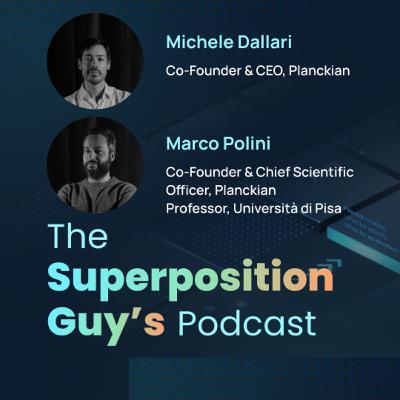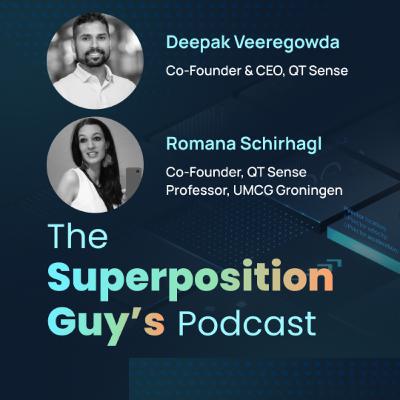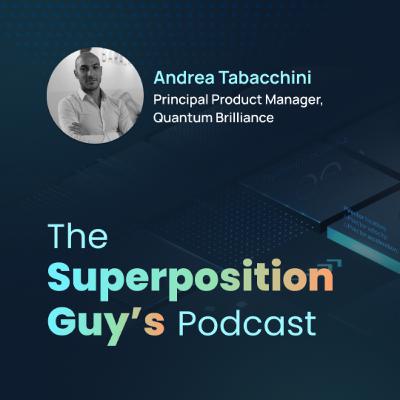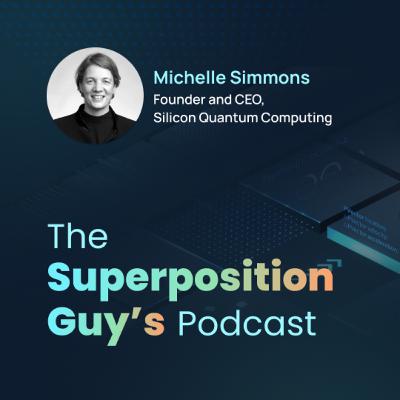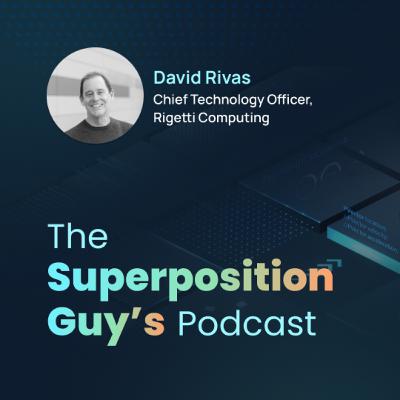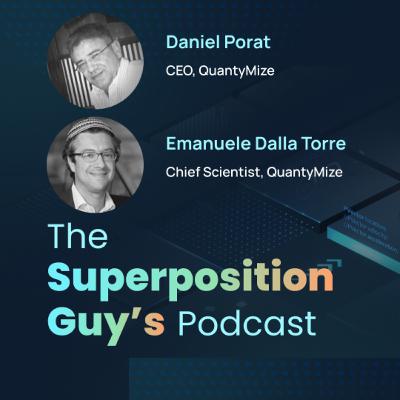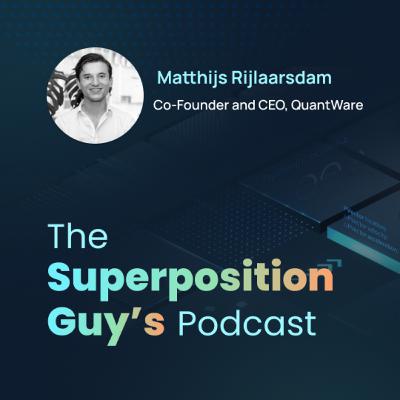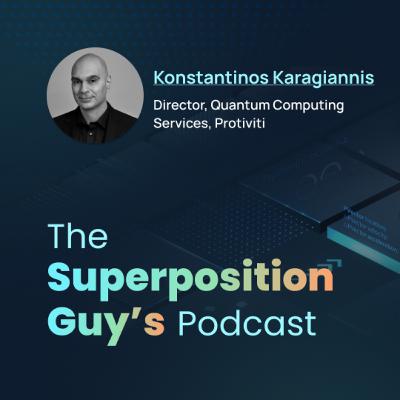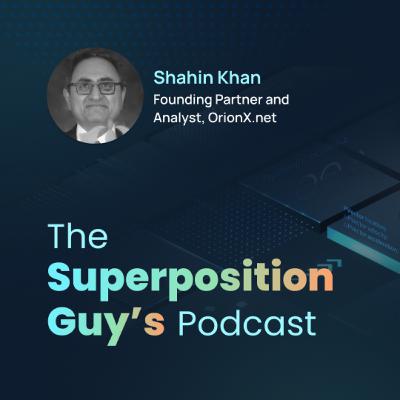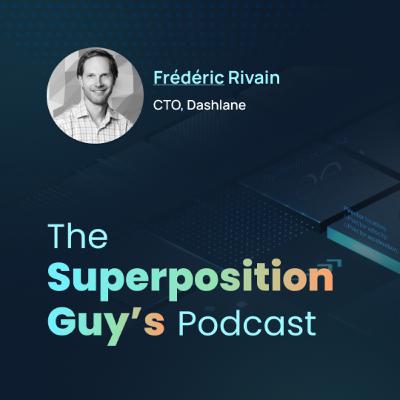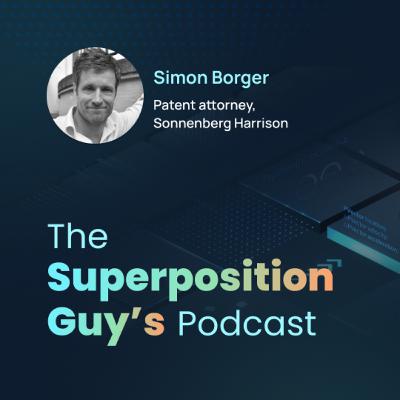Discover The Superposition Guy's Podcast
The Superposition Guy's Podcast

The Superposition Guy's Podcast
Author: Yuval Boger
Subscribed: 38Played: 929Subscribe
Share
© Yuval Boger
Description
Yuval Boger, Chief Commercial Officer at QuEra, hosts thought leaders in quantum computing, quantum sensing, and quantum communications to discuss business and technical aspects that impact the quantum ecosystem. Full transcripts are available at podcast.yboger.com
143 Episodes
Reverse
Constanza Bustamante, a research fellow at the Center for a New American Security (CNAS) is interviewed by Yuval Boger to discuss quantum policy at the nexus of national and economic security. Constanza contrasts China’s state-led, scale-oriented model with the U.S.’s science-first, private-sector translation approach; traces bipartisan continuity from the National Quantum Initiative Act through today; and examines Europe’s growing techno-nationalism and reciprocity gaps. Constanza argues broad tariffs risk hobbling a nascent U.S. quantum supply chain, explores quantum sensing as a near-term “atomic advantage”, weighs research-security safeguards against academic openness, and much more.
Vijoy Pandey, who leads Cisco’s Outshift incubation group, and Reza Nejabati, Cisco’s head of quantum research, are interviewed by Yuval Boger. They discuss Cisco’s strategy to enable distributed quantum computing and a future “quantum internet.” Vijoy and Reza explain why Cisco won’t build QPUs, focusing instead on room-temperature, telecom-band entanglement networking. They discuss Cisco's aim is to make networking a “no-brainer” and push modality complexity to the edge via transducers and even entanglement-mode conversion, the argument that scale-out plus scale-up will reach “million usable qubits” faster, and much more.
Bert de Jong, Director of the Quantum Systems Accelerator (QSA) at Berkeley Lab, is interviewed by Yuval Boger. Bert describes how the center develops superconducting, trapped-ion, and neutral-atom technologies in parallel, and the importance of certification in verifying quantum computations. They discuss the roadmap for integrating quantum into HPC at NERSC, the cost and scaling challenges of large systems, and the Department of Energy’s focus on scientific—not cryptographic—applications. Bert also highlights creative approaches to error correction, opportunities for industry collaboration, the need for workforce training starting in high schools and community colleges, and why he believes quantum will deliver practical scientific impact within five years.
Sebastian Weidt, CEO and co-founder of Universal Quantum, is interviewed by Yuval Boger. They discuss his company’s unique approach to building scalable trapped-ion quantum computers. Sebastian explains how Universal Quantum focuses on overcoming key scaling challenges—such as error-free modular connections, laser-free control, and integrated electronics—rather than rushing small systems to market. He contrasts their 70K cooling and qubit-shuttling architecture with other modalities, addresses trade-offs like gate speed, and shares why algorithmic execution speed can offset slower clock cycles. Sebastian and Yuval also talk about the company’s €70M DLR contracts, its emphasis on software alongside hardware, and Sebastian’s view that quantum utility will likely emerge north of 10,000 qubits. Reflecting on entrepreneurship, he shares lessons learned about market education, the company’s engineering-heavy team, and much more.
Scott Buchholz, global leader for Deloitte Consulting's quantum computing efforts, is interviewed by Yuval Boger. Scott explains how Deloitte helps clients understand quantum technology and its potential applications, particularly in solving business problems. They discuss the timelines for quantum computing becoming commercially useful, referencing industry roadmaps. He emphasizes Deloitte's role in bridging the gap between technical jargon and business needs, helping clients navigate vendor selection, shares insights into the learning curve associated with quantum computing, highlights Deloitte's work in developing quantum-inspired machine learning solutions, and much more.
Yuval Boger interviews Tal David, CEO and co-founder of Quantum Art, a quantum computing company based in Israel focused on full-stack quantum computing with trapped ions. They discuss Quantum Art's unique architecture, which emphasizes sophisticated multi-qubit gate operations, optical tweezers for segmenting ion chains, and dynamic reconfigurability for scaling up to millions of qubits. Tal highlights the company's roadmap, including launching a 50-qubit system by 2025 and a 1,000-qubit system by 2027, with a long-term goal of achieving a million-qubit system. Tal also addresses the challenges and advantages of their approach, particularly regarding error correction and speed, and mentions collaborations with companies like NVIDIA and BlueQubit, emphasizes the importance of focusing on scalable architectures, and much more.
Scott Genin, Vice President of Materials Discovery at OTI Lumionics, is interviewed by Yuval Boger. Scott outlines his role in overseeing materials design and simulation programs, focusing on OLEDs and cathode patterning materials. He highlights OTI's growth and its strategic integration of quantum-inspired methods due to current limitations in quantum computing. Scott remains optimistic about the future of quantum but emphasizes the need for further advancements, particularly regarding error correction and cost efficiency. He also shares insights on a novel encoding method that allows OTI to emulate up to 80 qubits classically, significantly improving their simulation capabilities. They segway into the potential for quantum computing to impact vibronic spectra calculations, the importance of achieving meaningful results within a competitive business environment, and much more.
Preeti Chalsani, Chief Quantum Officer at Intersect Illinois, and Harley Johnson, CEO of the Illinois Quantum and Microelectronics Park, are interviewed by Yuval Boger. Preeti and Harley discuss the rapid creation and ambitious goals of the IQMP, a state-backed initiative to support the scale-up of quantum computing and microelectronics. They talk about the park’s public-private structure, a $500M infrastructure investment by the state, early tenants like PsiQuantum and and Diraq, and its emphasis on workforce development and cross-sector collaboration. They also explore Illinois’ unique advantages as well as the challenges of infrastructure timelines, community impact, managing expectations in a fast-moving field, and much more.
Michele Dallari, co-founder and CEO, and Marco Polini, co-founder, of Planckian, are interviewed by Yuval Boger. Michele and Marco talk about their company’s novel superconducting chip architecture, which uses global control and always-on ZZ interactions to drastically reduce wiring complexity and improve scalability. They discuss the advantages of controlling many qubits with just two or three classical lines, their early-stage experimental progress, and the software adaptations required to compile algorithms for their architecture. The conversation also touches on Italy’s growing quantum ecosystem, Planckian’s collaborative approach to chip manufacturing, their excitement about recent advances in pulse engineering to compensate for fabrication imperfections—and much more.
Romana Schirhagl, co-founder, and Deepak Veeregowda, CEO of QT Sense, are interviewed by Yuval Boger. QT Sense develops quantum sensing technology using NV center sensors in nanodiamonds for biomedical applications. Romana explains how their technology measures magnetic noise from free radicals inside cells, indicating cellular stress, similar to a small-scale MRI. Deepak discusses the company's product, Quantum Nova, which is available for research and diagnostic purposes, particularly in cancer and infectious disease detection. QT Sense describes their technology as having subcellular resolution and nanomolar sensitivity, sees a key advantage in applying NV sensors in living systems where the sensors move and rotate, and aim to impact millions of patients by 2030.
Andrea Tabacchini of Quantum Brilliance joins Yuval to discuss room-temperature quantum computing. Quantum Brilliance develops compact, diamond-based quantum accelerators for edge applications like robotics and satellites.Andrea explains their nitrogen-vacancy (NV) center technology, enabling stable qubits without cryogenic cooling. With innovations in deterministic defect placement and scalable nanoelectronics, they aim to launch a commercial 60–100 qubit quantum computer by 2029.He envisions small, low-power quantum processors working alongside classical systems and sees growing investment driving practical quantum applications within five years.
Michelle Simmons, CEO of Silicon Quantum Computing, is interviewed by Yuval Boger. Michelle’s company uses phosphorus atoms in silicon-28 to create high-fidelity, low-noise qubits with exceptional coherence. She highlights their multi-nucleus spin registers for all-to-all connectivity and native multi-qubit operations, achieving what she describes as industry-leading fidelities. We discuss their three products—quantum machine learning, analog simulation, and fault-tolerant quantum computing—and their progress. We also discuss the expected date of their error-corrected system, the key to accelerating their roadmap, and much more.
Maud Vinet, CEO and co-founder of Quobly, is interviewed by Yuval Boger. They discuss the company’s mission to build large-scale quantum computers based on silicon qubits. Maud explains how silicon offers unique advantages in scalability, leveraging decades of semiconductor expertise, and why the biggest challenge lies in qubit control rather than fabrication yield. Maud shares insights on her transition from semiconductor R&D to quantum computing, the partnerships Quobly has formed with fabs like STMicroelectronics, the anticipated timeline for achieving significant qubit counts, and much more.
David Rivas, Chief Technology Officer at Rigetti Computing, is interviewed by Yuval Boger. They discuss Rigetti’s approach to building superconducting quantum computers. David highlights the company’s full-stack capabilities, including its captive quantum fab and proprietary control systems, emphasizing the advantages of vertical integration for optimizing performance. He explains Rigetti’s chiplet-based approach to scaling quantum processors, their strategy for achieving large-scale, fault-tolerant quantum computing. They also cover the evolution of quantum computing architectures, Rigetti’s move to 3D signaling, and the role of logical qubits in scaling quantum processors, the importance of continued hands-on experimentation, the challenges of being a public company, and much more.
Daniel Porat and Prof. Emanuele Dalla-Torre of Quantymize are interviewed by Yuval Boger. They discuss their work in quantum optimization and hybrid quantum-classical algorithms. Daniel describes how the company focuses on real-world optimization problems in industries like energy, e-commerce, and scheduling, leveraging quantum computing to enhance efficiency. Emanuele describes the company’s core algorithm, called Efficient Correlated Optimization, which significantly reduces qubit requirements for solving complex combinatorial problems. They also cover the evolving quantum landscape in Israel, the potential for commercial quantum advantage today, the balance between publishing research and maintaining competitive business strategies, and much more.
Matthijs Rijlaarsdam, co-founder and CEO of QuantWare, joins Yuval Boger to discuss how his company is enabling the scaling of quantum processors through its VIO technology, a 3D chip architecture that addresses key bottlenecks in scaling qubits. Matthijs explains the three major challenges—fan-out, integration of components, and yield—and how VIO solves these to facilitate quantum chips with millions of qubits. He also shares insights into Quantware’s business model, which spans fully packaged chips, foundry services, and packaging services, drawing parallels to the semiconductor industry. They explore the impact of heat, signal routing, and error correction, the strategic importance of marketing and storytelling in the quantum industry, and more.
Konstantinos Karagiannis, who leads quantum computing services at Protiviti, joins Yuval Boger to discuss the dual aspects of quantum computing: its promise in transformative use cases and its threats in post-quantum cryptography. Konstantinos explains why organizations need to act now to secure their data against future quantum threats, emphasizing the importance of cryptographic agility and hybrid solutions. He highlights how different industries, particularly financial services and government, are leading the way in adopting post-quantum standards. They also explore the challenges of quantum key distribution, the evolving vendor landscape, and how organizations can prioritize their post-quantum journeys.
Shahin Khan, co-founder of OrionX, joins Yuval Boger to explore the intersection of quantum computing and high-performance computing (HPC). Shahin discusses why HPC is a natural early adopter of quantum technologies, the role of QPUs alongside GPUs and CPUs, and how quantum computing aligns with global megatrends. They delve into scaling challenges, the potential for quantum to revolutionize tensor-based problems, and the broader implications of quantum on energy efficiency and scientific discovery. Shahin also reflects on the industry’s progress, the importance of rational exuberance, and the need to set realistic expectations while maintaining excitement about quantum’s transformative potential.
Frédéric Rivain, CTO of Dashlane is interviewed by Yuval Boger. They discuss the intersection of quantum computing and cybersecurity. Frédéric explains how Dashlane is preparing for the post-quantum era by testing cryptographic algorithms, implementing crypto-agility, and anticipating the “Harvest Now, Decrypt Later” threat. They explore the role of NIST in standardization, the challenges of migrating to post-quantum cryptography, and the evolving nature of credential security. Last, they cover AI-powered phishing attacks, government preparedness for Q-Day, and much more.
Simon Borger, a physicist turned patent attorney, is interviewed by Yuval Boger. They discuss the evolving intellectual property landscape in quantum technologies. Simon shares insights on global patent trends, the role of startups versus large companies, and the challenges of filing patents for quantum innovations. They explore how to balance academic publishing with IP protection, the rising influence of European filings, and the surprising nuances of Chinese patent strategies, and much more.


